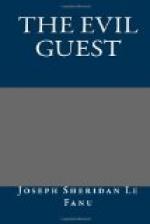Mrs. Marston, meanwhile, suffered from a horrible uncertainty. She never harbored, it is true, one doubt as to her husband’s perfect innocence of the ghastly crime which filled their house with fear and gloom; but at the same time that she thoroughly and indignantly scouted the possibility of his, under any circumstances, being accessory to such a crime, she experienced a nervous and agonizing anxiety lest anyone else should possibly suspect him, however obliquely and faintly, of any participation whatever in the foul deed. This vague fear tortured her; it had taken possession of her mind; and it was the more acutely painful, because it was of a kind which precluded the possibility of her dispelling it, as morbid fears so often are dispelled, by taking counsel upon its suggestions with a friend.
The day wore on, and strange faces began to fill the great parlor. The coroner, accompanied by a physician, had arrived. Several of the gentry in the immediate vicinity had been summoned as jurors, and now began to arrive in succession. Marston, in a handsome and sober suit, received these visitors with a stately and melancholy courtesy, befitting the occasion. Mervyn and his son had both been summoned, and, of course, were in attendance. There being now a sufficient number to form a jury, they were sworn, and immediately proceeded to the chamber where the body of the murdered man was lying.
Marston accompanied them, and with a pale and stern countenance, and in a clear and subdued tone, called their attention successively to every particular detail which he conceived important to be noted. Having thus employed some minutes, the jury again returned to the parlor, and the examination of the witnesses commenced.
Marston, at his own request, was first sworn and examined. He deposed merely to the circumstance of his parting, on the night previous, with Sir Wynston, and to the state in which he had seen the room and the body in the morning. He mentioned also the fact, that on hearing the alarm in the morning, he had hastened from his own chamber to Sir Wynston’s, and found, on trying to enter, that the door opening upon the passage was secured on the inside. This circumstance showed that the murderer must have made his egress at least through the valet’s chamber, and by the back-stairs. Marston’s evidence went no further.
The next witness sworn was Edward Smith, the servant of the late Sir Wynston Berkley. His evidence was a narrative of the occurrences we have already stated. He described the sounds which he had overheard from his master’s room, the subsequent appearance of Merton, and the conversation which had passed between them. He then proceeded to mention, that it was his master’s custom to have himself called at seven o’clock, at which hour he usually took some medicine, which it was the valet’s duty to bring to him; after which he either settled again to rest, or rose in a short time, if unable to sleep.




